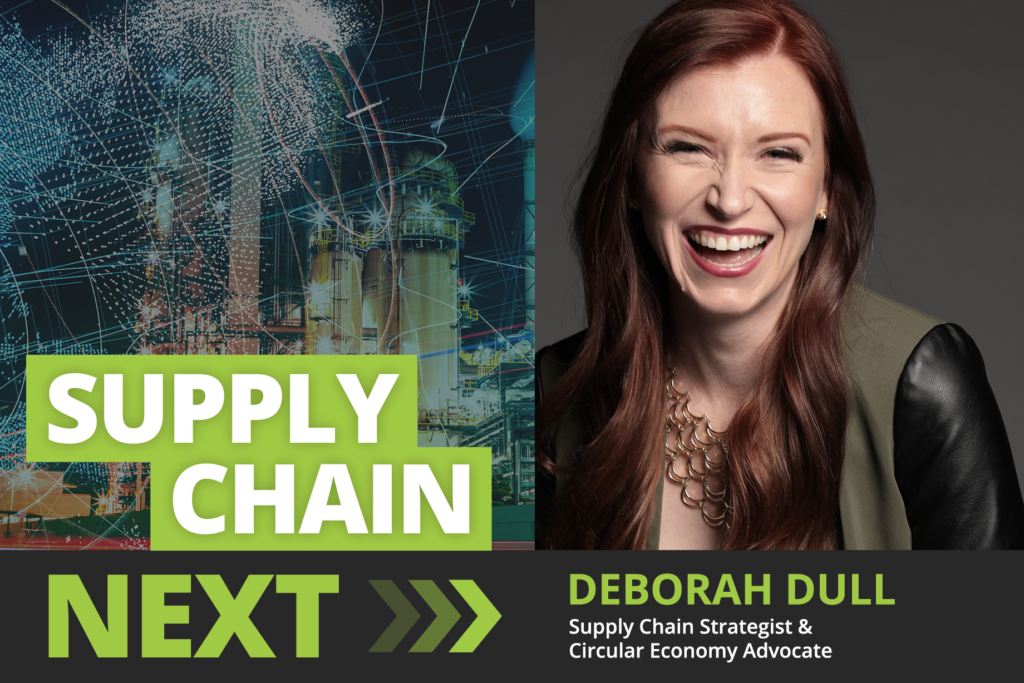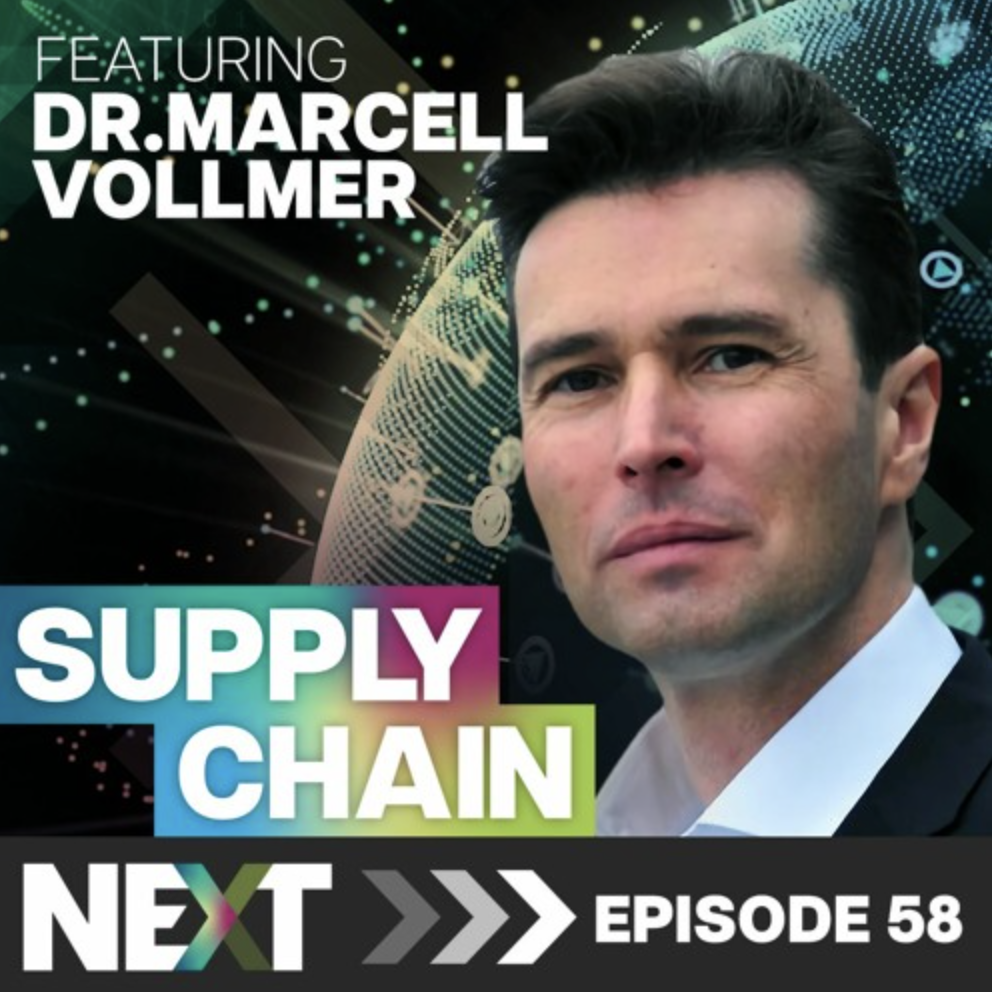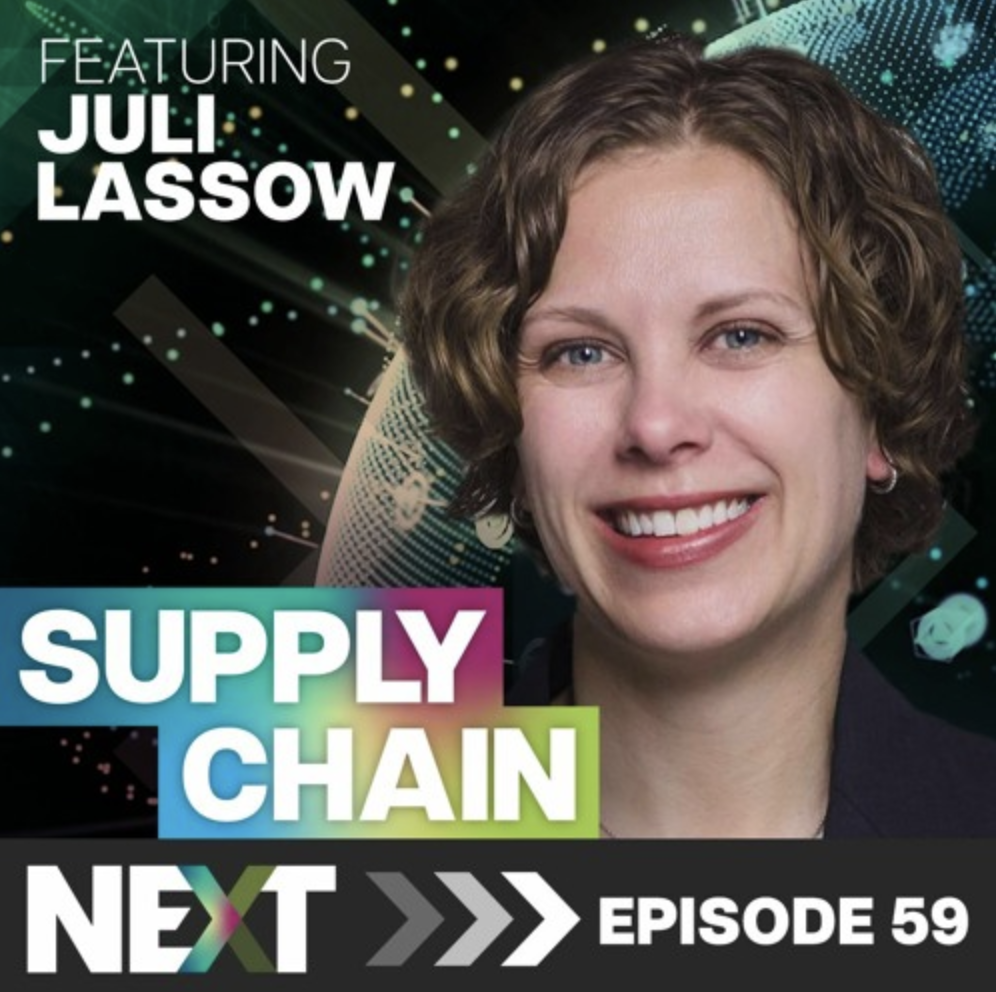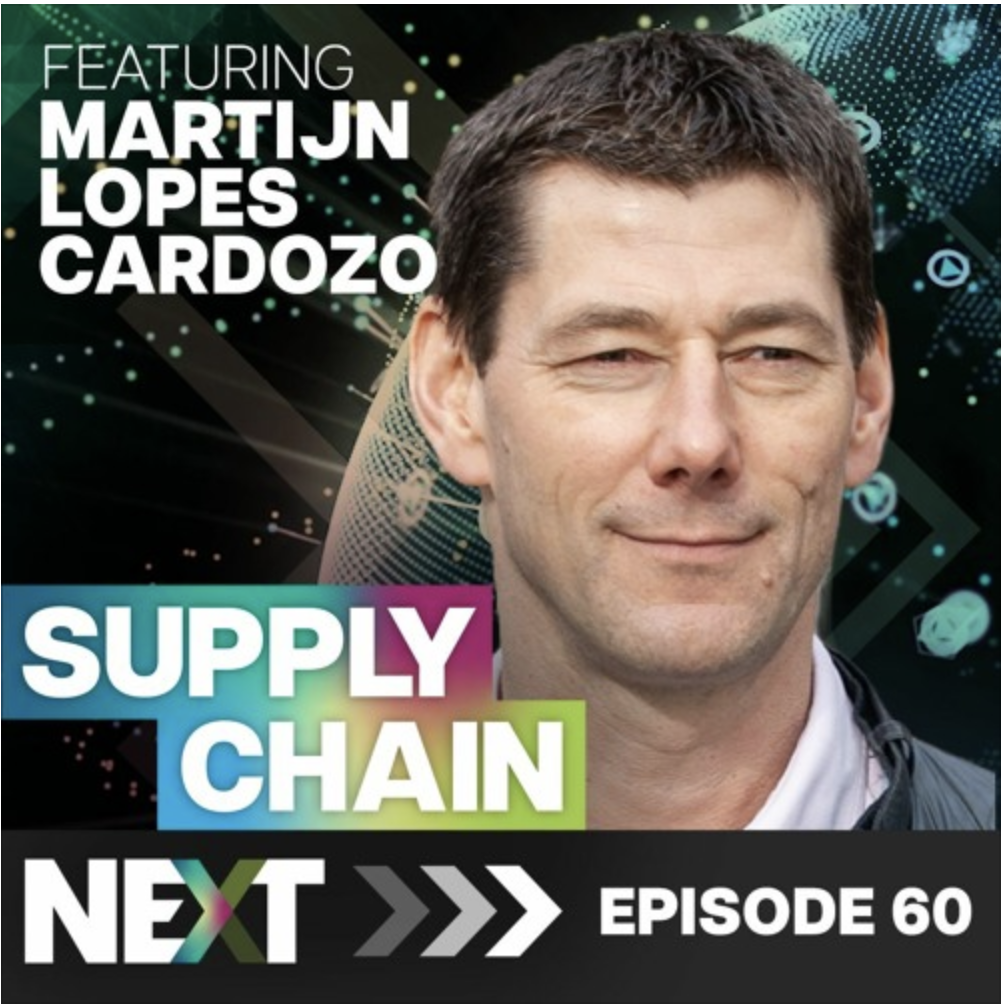Episode 11
Deborah Dull on the Circular Economy
Deborah Dull is a supply chain strategist and passionate circular economy advocate.
After several years in senior supply chain roles at Microsoft, Deborah was tapped to become the new Program Officer for Health Supply Chains at the Bill & Melinda Gates Foundation.
At the Foundation, she led the digital transformation of $1B in annual spending and developed processes to use technology better in developing countries.
Now a Principal in Manufacturing Product Management at GE, she is also part of the dynamic duo at Supply Chain Revolution. As the Circular Nomad™, she travels the world helping organizations unlock the many benefits of the circular economy.
On this episode of Requis’s Supply Chain Next Podcast, Deborah joins host Richard Donaldson to talk about the circular economy, its challenges, and the benefits it has for both businesses and society.

Transcript from Deborah Dull Podcast Episode
What’s behind the moniker ‘the Circular Nomad™’?
- I am fascinated by the question: How do we use the resources already in play around the world as the only inputs for the world’s economy?
What is the difference between circularity and sustainability?
- In supply chains sustainability is expressed across money, ethics, and the environment.
- In supply chains circularity really focuses in on the money and the environment. Circularity is a means to become sustainable. The ethics are still there, but it becomes more of a by-product of becoming more regional.
What’s holding enterprises back from participating more fully in the circular economy?
- The research available says that municipal waste is less than 10% of the waste we produce as a society. The rest is from construction and industry.
- As consumers, our options for recycling are limited by the infrastructure we have available. For example, we can only recycle where the municipality supports it, and to the degree it is supported. For example, glass bottle recycling is no longer available in the small town I grew up in. The next question becomes, why do we melt down glass bottles for reuse instead of just washing and reusing them? So many countries are already doing this. I think supply chain managers are best suited to solve for circularity here.
- Why hasn’t industry moved more towards circularity? There are a few main points on this.
- Firstly, there is a perception, at least in the US, that the circular economy equals corporate social responsibility (CSR), which equals losing money. But you can and should be making money. We’re far behind other developed markets who are already further down the path on this.
- Secondly, there is the issue of supply. The secondary market for a material can be easily wiped out in an instant if a large player buys up the supply. Some companies are having a hard time even finding sources. The irony is that materials we could be using are being burned as trash to generate power. Once that happens, you can never get the material back again.
- Recycling should be the path of last resort for circularity. You should leave something as it is for as long as possible. The Ellen MacArthur Foundation’s butterfly diagram shows six alternative material flows before recycling.
- We need to stop burning things and stop throwing them away.
- Thirdly, there are material sciences constraints. Materials have to be designed in advance for recycling. For example, carbon fiber wind turbine blades become non-recyclable as soon as you coat them with fire retardant.
- These factors have contributed to the lack of big, bold, reproducible sustainability systems.
- For some companies, sustainability is a nice to have. But if you can explain the economic tie to sustainability and circularity, they can understand that it’s in their financial interest.
- Strategic sourcing managers are the superstars in a supply chain, certainly not the reverse supply chain people!
- Things are changing in supply chain. Now we’re being asked to be transparent and agile and flexible— tons of things we’ve never had to do before— whereas before supply chain was invisible, or at best, “good job, you didn’t mess it up”!
How is COVID-19 changing supply chain and changing the drive to the circular economy?
- It’s accelerating. We’re starting to look at circularity as a lever for disruption mitigation.
- There have always been disruptions and there will continue to be disruptions. They happen all the time. This one, however, is longer, more complex, and involves multi-region supply chains.
- The premise behind circularity is shorter supply chains. To do this you stay regional and skip the step where you harvest the raw materials from a mine or an oil rig or a forest. There are several benefits to this:
- Disruptions are easier to understand and solve for because they’re local.
- With fewer tiers, it’s easier to have a better relationship with more of your suppliers.
- There is more ethical treatment for the people in our supply chains.
- It becomes easier to make things on demand.
- We already have enough for everyone, the problem is that it’s just not in the right places. That, and we build for one-time use, not circularity.
- COVID-19 shortages have been called a “global supply chain fail”, but I don’t think that’s what it is. I think it’s a shift from a linear, one-time-use economy to a circular one.
- The majority of consumers won’t feel a large extra burden of a circular economy. Sure, there may be less single-use plastic, and they may need to pay a deposit on a bottle. But overall things will continue to flow in their daily lives.
- The best thing we can do now is use COVID as a platform to talk to each other. The problem has been that business folks have been resisting circularity for the reasons we’ve talked about (and others), and the sustainability folks tend to resist the whole of the current economy because they see it as the source of the problem.
- Since we’re all locked down anyway, let’s start talking about it, because the businesses that are getting this right are saving billions of dollars.
How do we convince businesses of the positive impact of circular economies on margins and bottom lines?
- There are three big examples of this we can share: Proctor and Gamble switched to a zero-waste policy about 10 years ago and have saved or deferred $10 billion, Henkel has been working towards zero waste for about 25 years, and Renault with their pioneering refurbishment work.
- One of the first examples of a circular economy is called the Kalundborg industrial symbiosis in Denmark, in which 11 companies co-located to share inputs and outputs, like waste heat.
- The US Chamber of Commerce did a study that confirmed the business case for circular economies for over 300 businesses on the East Coast. All that was lacking was a champion to take the lead.
Are you seeing an uptick in requests for this kind of consulting?
- “COVID” is the sexy term right now. What we’re seeing is an increase in communications with “COVID” in them that don’t really have a lot of thought put into how COVID does or doesn’t play into this.
- I haven’t seen a lot of discussions about meaningful impact with steps we can do to make real change.
What are the big things you see coming for the industry for the next six months to a year for the industry?
- My hope for the field is that we use this time to be an ambassador for supply chain. Be excited. Enjoy explaining these concepts that are simple to us but the rest of the world often doesn’t get. Create a bridge between our world of running the world, and everything else in business.
- I see more folks getting excited about this field. Now is the time to be in supply chain!
- I’m hoping we can see some motion from operations into management.
- I see more regionalization.
There’s so much more depth (and fun!) in Deborah and Richard’s actual conversation. Listen to the Full Podcast on Soundcloud >
More About Deborah Dull
Deborah got hooked on supply chain while taking an Introduction to Operations Management course while earning her marketing degree. After a successful run with Microsoft and with her MSc in Supply Chain and Operations Management in hand, she got the call from Bill and Melinda Gates to improve their healthcare supply chain.
Her work for the Foundation had a profound impact on Deborah as she realized that “supply chains are often what are preventing people from being healthy”.
Fundamentally a builder and launcher, Deborah decided that her next challenge lay in the circular economy. Finding some like-minded people at GE Digital and realizing the scale of the opportunity for global leadership, she jumped on board.
But she also wanted to help more businesses make the connection between circularity, supply chain, and better margins. Deborah met Sherri Hinish online, and together they started a consultancy and podcast. On the Supply Chain Revolution podcast, they explore topics in circularity and showcase the people who are making it happen.
More Episodes
You can listen to our audio tracks and read highlights for each episode below.
We’ve also started publishing video episodes on our YouTube channel.
058 – Dr Marcell Vollmer – Tech in Supply Chain, and the Sustainability Shift
Supply Chain Next · 058 – Dr Marcell Vollmer – Tech in Supply Chain, and the Sustainability Shift Meet Dr. Marcell Vollmer Dr. Marcell Vollmer, a renowned expert in the fields of digitalization, innovation, and sustainability. Marcell is a sought-after speaker and author that has dedicated his career to helping companies and individuals navigate the rapidly…
059 – Juli Lassow – Revolutionizing Retail, Sustainable Strategies, & the Future of Partnerships
Supply Chain Next · 059 – Juli Lassow – Revolutionizing Retail, Sustainable Strategies, & the Future of Partnerships Juli Lassow ,founder of JHL Solutions Meet Juli Lassow Juli Lassow, an accomplished retail professional, speaker, writer, and sustainability advocate, is the founder of JHL Solutions, a consultancy focused on creating outstanding private-label partnerships. With a deep…
060 – Martijn Lopes Cardozo – Circular Supply Chain
Supply Chain Next · 060 – Martijn Lopes Cardozo – Circular Supply Chain Martijn Lopes Cardozo, CEO at Circle Economy Meet Martijn Lopes Cardozo Martijn, a seasoned entrepreneur, has an impressive track record of establishing prosperous ventures within the realms of software, mobile, and digital media in California. Upon returning to the Netherlands, he…



